|
|
|
Sort Order |
|
|
|
Items / Page
|
|
|
|
|
|
|
| Srl | Item |
| 1 |
ID:
153156
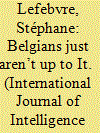

|
|
|
|
|
| Summary/Abstract |
“The Belgians just aren’t up to it,” said a French intelligence source anonymously after the 13 November 2015 terrorist attacks in Paris.1 Robert-Jan Bartunek “Belgium Hits Back at French Criticism Over Lax Intelligence,” Reuters, 17 November 2015, at
http://www.reuters.com/article/france-shooting-belgium-criticism-idUSL8N13C3OV20151117
, accessed 17 November 2015.
Surely frustrated by the connections surfacing between the attackers and Belgium, he or she may have had a point. Throughout the 1980s the Belgian intelligence services were routinely criticized, fairly or unfairly, for just about anything.2 “Every institution experiences difficulties at some time or another. The 1980s was just such a period […]. Now we need to pull ourselves together, overcome our difficulties, and go about restoring people’s confidence. We have learned the lessons of the past.” Nancy Ferroni, interview with SE Administrateur général Bart Van Lijsebeth, “Soulever un coin du voile du secret,” Le Vif/L’Express, 5 March 1999, p. 18.
In the 1990s, those services were thought, as a Belgian intelligence officer put it, to be operating “like something out of the Middle Ages.”3 Nancy Ferroni “Le Spy Blues,” Le Vif/L’Express, 5 March 1999, p. 16. In more recent years, Belgium has been increasingly seen as a hotbed of Islamic radicalization and as a staging ground for terrorist attacks.
|
|
|
|
|
|
|
|
|
|
|
|
|
|
|
|
| 2 |
ID:
133536
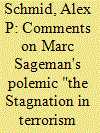

|
|
|
|
|
| Publication |
2014.
|
| Summary/Abstract |
Marc Sageman's lamenting about the "Stagnation in Terrorism Research" stands in stark contradiction to my conclusion in the Routledge Handbook of Terrorism Research (2011) that "Terrorism Studies-despite many shortcomings-has matured" and that "Terrorism Studies has never been in better shape than now." 1 While I agree with much else of what Marc Sageman says, there are a few points I disagree with. To begin with the notion of "stagnation": Terrorism Studies began, with few exceptions (Crozier, 1960; Thornton, 1964; Walter, 1964, 1969; Gaucher, 1965), 2 in the 1970s. Yet there had never been a period of real bloom in the 20th century-something which logically should precede the alleged stagnation after 9/11. As Andrew Silke noted in 2006:
|
|
|
|
|
|
|
|
|
|
|
|
|
|
|
|
| 3 |
ID:
133535
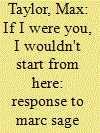

|
|
|
|
|
| Publication |
2014.
|
| Summary/Abstract |
Have you heard the story about the Englishman lost in an Irish mist trying to find the route to Limerick? He reaches a country crossroads, and asks an old man for directions; after much thought the old man's answer is, "If I were you I wouldn't start from here." From Sageman's account, you might in many ways infer that's the story of much contemporary terrorism research, and is, it seems to me, the unstated fundamental assumption behind his paper-if we had the freedom to start from scratch, if we were designing an area of study to investigate how violence is used to do things to influence political decision making, we'd probably want to conduct ourselves in a different way than we have. But we are where we are. Whether we like it or not, in studying terrorism and the terrorist, we engage with a world in which governments, officials, and politicians largely define the agenda (and keep changing it), set the rules for risk tolerance, and to a large extent control the money and through the choices they make direct research agendas.
|
|
|
|
|
|
|
|
|
|
|
|
|
|
|
|
| 4 |
ID:
106575
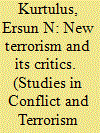

|
|
|
|
|
| Publication |
2011.
|
| Summary/Abstract |
This article attempts to fulfill a lacuna in the literature on terrorism by providing a systematic response to the widespread criticism of the concept of "new terrorism." According to this conceptualization, the "new terrorism" is characterized by religious motivation, networked organizational structures, tendency to launch mass casualty attacks and possible use of weapons of mass destruction. This conceptualization is criticized by scholars who argue that religiously motivated terrorism has always existed; that increased frequency of mass casualty attacks is due to other factors; that traditional terrorists were also indiscriminate in their targeting; and that there is nothing new about terrorist attempts to use WMDs or horizontal terrorist networks. These critics are not convincing on three counts: they adopt a rudimentary notion of "new" which is hardly appropriate for detecting or understanding social change; they employ inappropriate categories and labels, which make it impossible to distinguish the characteristic features of new terrorism from those of the old; and several critics create a straw man version of the "new terrorism" argument by resorting to reductionist interpretations. The article points out that the contemporary terrorism is not only religious, but is also characterized by the absence of several ideological and political imperatives for centralized and hierarchical organizational structures and for using discriminate violence that characterized left wing and ethno-nationalist terrorism of the past. The critics also ignore the fact that there is a declared intention on the part of new terrorists to organize horizontally through networks and to kill indiscriminately among civilians.
|
|
|
|
|
|
|
|
|
|
|
|
|
|
|
|
| 5 |
ID:
133537


|
|
|
|
|
| Publication |
2014.
|
| Summary/Abstract |
Anyone who cares about both the national security threat arising from transnational al Qaeda-inspired terrorism and the need to develop a measured, effective response to this threat owes a great deal of gratitude to Marc Sageman. He was an early teller of inconvenient truths. As he notes in his essay, the tumultuous years following 9/11 were marked by the rise and mass dissemination of wild, ahistorical, and anecdote-based theories about the causes and possible solutions to violence motivated by the virulent ideology propagated by Sayyid Qutb in the 1950s and tragically brought to our shores by Osama bin Laden. Sageman insisted, however, that theory must be supported by evidence. He presented the facts as he saw them without regard to those he was undercutting on each side of the political spectrum. Over a decade after 9/11, his work has withstood the test of time and had a significant positive impact on our understanding of why al Qaeda attacked us and our policies for confronting this threat.
|
|
|
|
|
|
|
|
|
|
|
|
|
|
|
|
| 6 |
ID:
133539


|
|
|
|
|
| Publication |
2014.
|
| Summary/Abstract |
Dr. Sageman makes a good point that despite the influx of government funding in the last decade, terrorism scholars have not been able to answer what he calls a "simple question"-what leads a person to turn to political violence? But Dr. Sageman's conclusion that scholars' inability to answer this question is evidence of stagnation in the field is incorrect. First, most scholars who study terrorism are addressing risk factors for terrorism at the level of societies, not individuals, so it is hardly surprising that there is no "consensus answer" to Dr. Sageman's question. Second, the question Dr. Sageman poses about individual level decision-making is not at all simple to assess. It is difficult to make gross generalizations about what leads individuals to do what they do in any area of life; difficulty in answering this question is not unique to terrorism experts. Consider analogous questions about individual decision-making with regard to other life choices. Despite significantly more than a decade of study, neither scientists nor humanists have been able to explain, ex ante, what leads a person to fall in love, to murder another, or to choose a particular career path (as a terrorist, or otherwise). A detailed study of an individual's life history might enable scholars to propose ex post hypotheses as to why that individual chose a career as a terrorism expert rather than as a terrorist, but even then, experts from varying disciplines (including psychiatry) would focus on different parts of the problem, seen through different lenses. It is not clear why Dr. Sageman holds terrorism scholarship to a standard that no other group of scholars aiming to understand and predict human behavior has yet been able to achieve.
|
|
|
|
|
|
|
|
|
|
|
|
|
|
|
|
| 7 |
ID:
126683
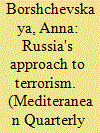

|
|
|
|
|
| Publication |
2013.
|
| Summary/Abstract |
A superficial look at Russia's current problems with terrorism and Muslim extremism may lead to the conclusion that the United States and Russia have similar views on this issue, which would therefore make them obvious partners in addressing the problems. Russian president Vladimir Putin promoted this position in the aftermath of the 11 September 2001 attacks in the United States and renewed this claim after the Boston Marathon bombing of April 2013. However, the Kremlin's view on terrorism is different from Washington's. The history of Russian domination and abuses in the Caucasus, the chaos and poverty that followed the breakup of the Soviet Union, and the Kremlin's human rights violations in Chechnya in many ways contributed to the rise of terrorism and Muslim extremism in Russia. In addition, the Kremlin uses terrorism as an excuse for an increased crackdown on civil society and for the lack of democratization in Russia. The Barack Obama administration therefore should have no illusions about the limitations on US-Russian cooperation on terrorism
|
|
|
|
|
|
|
|
|
|
|
|
|
|
|
|
| 8 |
ID:
133538
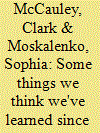

|
|
|
|
|
| Publication |
2014.
|
| Summary/Abstract |
It is a pleasure to have this opportunity to respond to a distinguished colleague's concerns about the progress of terrorism research since the 9/11 attacks. Marc Sageman sees little progress and identifies numerous impediments to research, notably including lack of good data and over-reliance on formal modeling
|
|
|
|
|
|
|
|
|
|
|
|
|
|
|
|
|
|
|
|
|